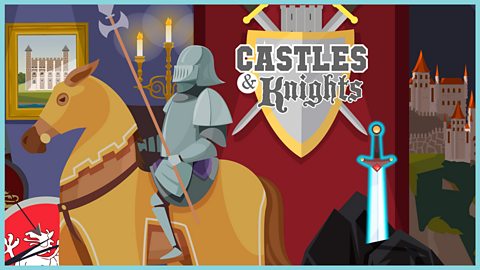The plan to blow up the Houses of Parliament and the arrest of Guy Fawkes.
Ooh sparklers! Hooray for Bonfire night! IsnтАЩt it beautiful?
MEOW
Eeek! Fire is dangerous. ThatтАЩs why everybody must stand back from fireworks. Fireworks have a long tail so you donтАЩt have to get too close to light them. The tail is called a fuse the flame travels along the fuseтАж untilтАж
BANG
Inside the rocket is gunpowder. When fire touches it the gunpowder bangs and the rocket explodes.
BOOM
You get bigger bangs with more gunpowder. The biggest bangs need the biggest rockets that can carry the most gunpowder.
Ow! Too much gunpowder!
Now one rat in my family knew all about gunpowder. She lived over four hundred years ago in the time of Guy Fawkes and the Gunpowder Plot.
There she is careful! ThatтАЩs Guy Fawkes. He was part of The Gunpowder Plot - a secret plan to blow up King James I using gunpowder. Guy FawkesтАЩ job was to wait for the king to enter the Houses of Parliament - the countryтАЩs most important building - and then light some gunpowder to blow up the whole building king and all.
The plotters have got lots of barrels of gunpowder and a cunning plan. Their first plan was to sneak 36 barrels of gunpowder to the building next door then dig a tunnel underneath. Sounds like тАШard work. But then they found they could use a room underneath the Houses of Parliament. Sounds easier.
Let's do that. Come on we need to get this first lot of gunpowder to Guy Fawkes.
WhatтАЩs the hurry? The king wonтАЩt be in the Houses of Parliament until 5th November.
5th November? My relative is going there on that day. IтАЩll write a letter and warn him to stay away.
But arenтАЩt we supposed to keep the plot a secret?
DonтАЩt worry IтАЩll tell him not to tell his friendsтАж
SoтАж a warning note a plotter wrote. Ooh that rhymes. But hereтАЩs the thing. They say that someone showed it to the king. He looks terribly fed up.
IтАЩm terribly fed up! People keep plotting against me I thought everybody loved the kingтАж Guards!
A fresh handkerchief your highness?
Search the Houses of Parliament! If you find ANYONE plotting against The King treat themтАж VERY. BADLY.
I like blowing things up.
So Guy Fawkes was hiding in the cellar waiting. The King was due to arrive on the 5th November. When the King arrived Fawkes would get his chance to light the fuse and blow up the king butтАж
Ello ello ello! We are arresting you in the name of the king. Do you have anything to say?
I donтАЩt like blowing things up not me squire.
Hmmm. Stand up! WhatтАЩs your name?
My name is er тАж John тАж?
WhatтАЩs your surname John?
ErmтАж JohnтАж JohnтАж son?
OK. Come on to the dungeon with you John Johnson. You are in trouble. Bad trouble.
So theyтАЩve caught Guy Fawkes тАУ he pretended to be called John Johnson to confuse them. The guards want to know if he was acting alone or with other plotters. What do you think will happen to him?
2. What happened during The Gunpowder Plot?
Robert Catesby's initial plan was to tunnel under the Houses of Parliament and place the gunpowder there. But the plotters discovered they could actually rent a chamber directly under the House of Lords - so a tunnel wasn't necessary.
On the night of 4 / 5 November 1605 Guy Fawkes was in the chamber. He was surrounded by 36 barrels of gunpowder and had only a few short hours to wait before King James I - and several leading members of the Protestant establishment - would arrive for the opening of a new session of parliament.
However, suspicion that a plot was imminent had been aroused by a letter, assumed to be written by one of the plotters: it was a warning to keep away from parliament on 5 November. Searches were made of the building and Fawkes was discovered before he could carry out the plan. He was imprisoned in the Tower of London.
Further resources
Download / print the notes including illustrations, poetry templates and worksheets (pdf)
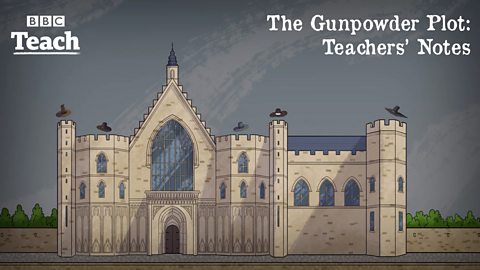
Download / print templates for shadow puppets of Robert Catesby, Guy Fawkes, Maureen and James I (pdf)
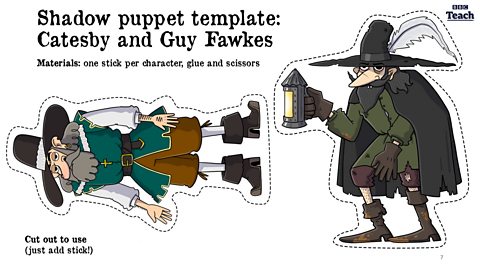
Download / print an illustration of The Tower of London to colour in and label (pdf)
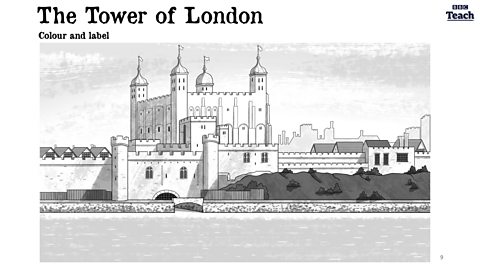
Songs
Consolidate pupils' learning about The Gunpowder Plot with these three catchy songs from our Music pages.
1. Shadows in the night
A hushed, conspiratorial song about the plotters.
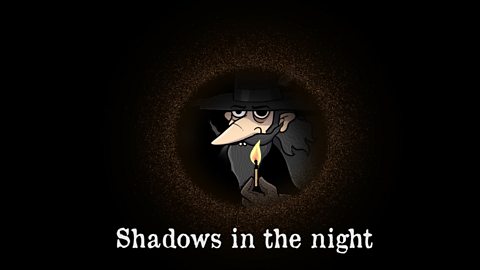
2. Hundreds of years ago
A song about the main events of the The Gunpowder Plot.
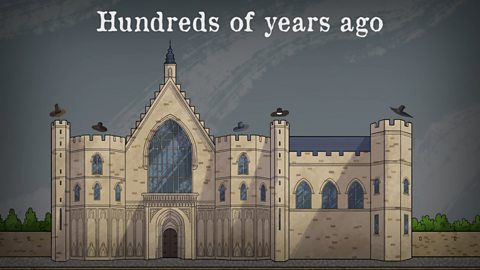
3. Remember, remember
A song incorporating the words of the famous rhyme 'Remember, remember'.
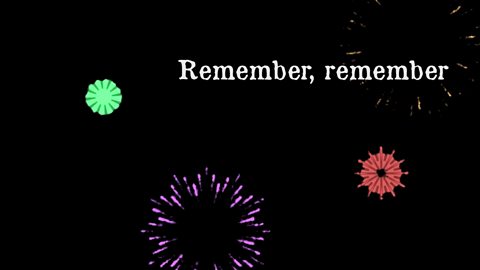
Teachers' Notes
Before the video
Watch videos of fireworks: how do they work? Discuss the use of gunpowder in fireworks and in relation to The Gunpowder Plot.
Discuss what is important to the children - for example, what they do in their free time? How would they feel if they were deprived of those things or they were changed? This is a useful parallel to the religious context of the story.
Discuss how Catesby and the other Catholic plotters felt at being told they couldnтАЩt practise their religion. Was his motive right? Were his actions wrong?
During the video
During the video, the teacher can stop and ask pupils the following questions:
Did the plotters plan to break into Parliament? (No. They actually took out a lease on the undercroft below the House of Lords and had legal access. The barrels were built up over a number of months.)
Why did one of the plotters write to his relative? (His relative was due to travel to Parliament on that day and he wanted to keep him safe.)
Who saw the warning note? (James I)
What did the guards do when they found Fawkes? (They arrested him and took him to the Tower of London.)
After the video
Consider the closing question of the video: what do you think will happen to Guy Fawkes? Share ideas. What should happen to him?
Write a speech bubble from James IтАЩs point of view when he discovers the warning note.
Create a тАШWantedтАЩ poster for Catesby.
Write a letter to James I from FawkesтАЩ relatives trying to persuade him to forgive Fawkes and release him.
This video is relevant for teaching History at KS1 in England, Wales and Northern Ireland and 1st Level in Scotland.
More from this series
1: Why did The Gunpowder Plot happen? video
The story begins in the present on Bonfire Night before going back in time to explain the circumstances that led to the Plot and introduce the key people involved.
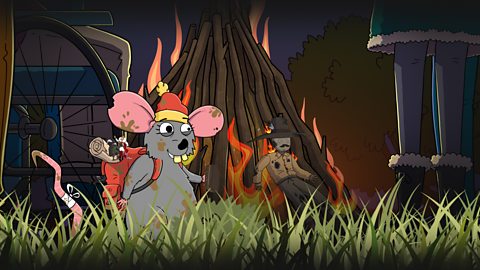
3: What happened after The Gunpowder Plot? video
We learn what happened to Guy Fawkes, how the names of the other plotters were discovered and how the events of 1605 led to modern-day celebrations.
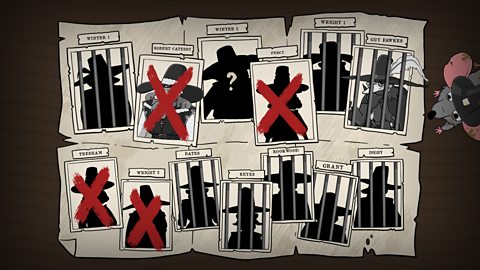
Who were the famous people involved in The Gunpowder Plot? image
An image slideshow showing the main characters in The Gunpowder Plot.
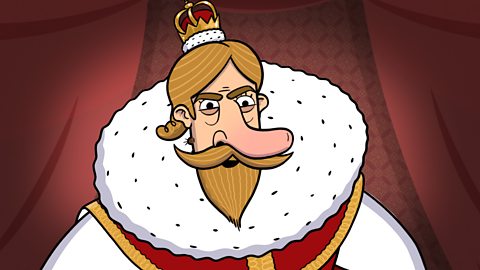
See also...
The Great Fire of London. collection
Three short animations covering the events and conditions that led to The Great Fire of London, what happened when the citizens, Lord Mayor and King tried to put it out тАУ and the consequences of their actions.
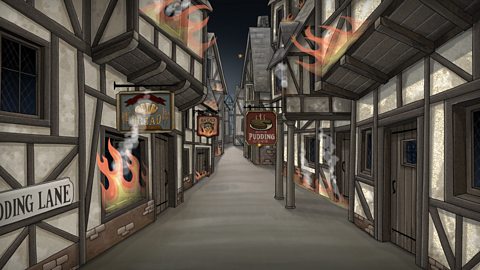
Castles and Knights. collection
A series of six animations exploring the topic 'Castles and Knights' with additional photos, illustrations and worksheets.
